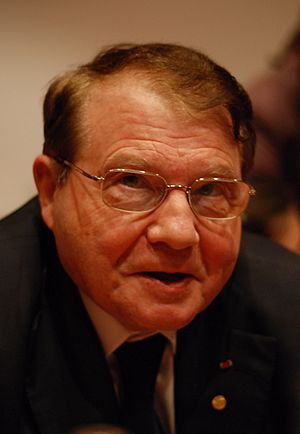Luc Montagnier facts for kids
Quick facts for kids
Luc Montagnier
|
|
|---|---|

Montagnier in 2008
|
|
| Born | 18 August 1932 |
| Died | 8 February 2022 (aged 89) Neuilly-sur-Seine, France
|
| Alma mater |
|
| Known for | Co-discoverer of HIV |
| Awards |
|
| Scientific career | |
| Fields | Virology |
| Institutions |
|
Luc Montagnier (1932–2022) was a French scientist who studied virology, which is the study of viruses. He is famous for helping to discover the human immunodeficiency virus (HIV). This virus causes AIDS, a serious disease that weakens the body's immune system.
In 2008, Montagnier won the Nobel Prize in Physiology or Medicine. He shared this important award with Françoise Barré-Sinoussi for their work on HIV. He also shared it with Harald zur Hausen, who discovered that some viruses can cause cervical cancer. Montagnier worked as a researcher at the Pasteur Institute in Paris, France, and later as a professor in China.
During the COVID-19 pandemic, Montagnier shared some ideas about the SARS-CoV-2 virus (which causes COVID-19). These ideas were not supported by most other scientists. Some experts criticized him for using his Nobel Prize status to share health messages that were outside his main area of knowledge.
Contents
Early Life and Education
Luc Montagnier was born on August 18, 1932, in a town called Chabris in France. He became very interested in science when he was a teenager.
He went to the University of Poitiers in France to study science. Later, he became an assistant at the Faculty of Sciences at Sorbonne University in Paris. There, he earned his PhD, which is a high-level university degree.
Montagnier's Scientific Career
In 1960, after finishing his studies, Montagnier moved to Carshalton in the United Kingdom. He worked there as a postdoctoral fellow at a special unit that researched viruses.
In 1963, he moved to Glasgow, Scotland, to work at the Institute of Virology. During this time, he developed a new way to grow viruses in a laboratory.
From 1965 to 1972, Montagnier was the head of a laboratory at the Institut Curie in Paris. After that, he moved to the Institut Pasteur, where he studied how a substance called interferon affects viruses.
Discovering the HIV Virus
In 1982, a doctor named Willy Rozenbaum asked Montagnier for help. The doctor was seeing patients with a new, mysterious illness that was later called AIDS. Rozenbaum thought a type of virus called a retrovirus might be causing it.
Montagnier and his team at the Pasteur Institute had a lot of experience with retroviruses. His team included Françoise Barré-Sinoussi and Jean-Claude Chermann. They examined samples from Rozenbaum's patients.
They found a new virus in a lymph node sample. They called it "lymphadenopathy-associated virus," or LAV. They published their findings in the journal Science in May 1983. At first, they weren't sure if this virus was the exact cause of AIDS.
The Discovery Dispute
Around the same time, another team led by Robert Gallo in the United States also published similar findings. Gallo's team confirmed that the virus caused AIDS. They called their virus "human T-lymphotropic virus type III" (HTLV-III).
For many years, there was a disagreement about which group first found the virus. This was a big deal because a US government patent for an AIDS test was at stake.
In 1987, the French and American governments decided to share the credit for the discovery. They also agreed to split the money from the patent. Montagnier and Gallo were named co-discoverers.
The two scientists continued to have some disagreements until the presidents of France and the United States met. They helped to sort out the main issues.
In 1986, both the French name (LAV) and the US name (HTLV-III) for the virus were replaced with a new term: human immunodeficiency virus (HIV).
It is now agreed that Montagnier's group was the first to isolate HIV. However, Gallo's group is credited with proving that the virus causes AIDS. Gallo's lab also developed important techniques, like growing T cells in the lab, which helped in the discovery.
In 2002, Gallo and Montagnier published articles together in Science. In these articles, they both recognized the important roles each had played in the discovery of HIV. This showed that they had put their past disagreements behind them.
Personal Life and Death
Luc Montagnier married Dorothea Ackerman in 1961. They had three children together. He passed away in Neuilly-sur-Seine, France, on February 8, 2022, at the age of 89.
Awards and Honors
Luc Montagnier received many important awards for his scientific work.
- In 2008, he won the Nobel Prize in Physiology or Medicine with Françoise Barré-Sinoussi for discovering HIV.
- He was a co-founder of the World Foundation for AIDS Research and Prevention.
- He received over 20 major awards, including the National Order of Merit and the Légion d'honneur from France.
- Other awards include the Lasker Award, the Scheele Award (1986), the Louis-Jeantet Prize for medicine (1986), the Gairdner Award (1987), the Golden Plate Award (1987), the King Faisal International Prize (1993), and the Prince of Asturias Award (2000).
- He was also a member of the Académie Nationale de Médecine, a prestigious French academy.
See also
- In Spanish: Luc Montagnier para niños
- And the Band Played On, a book about the discovery of AIDS
- History of RNA biology
 | Charles R. Drew |
 | Benjamin Banneker |
 | Jane C. Wright |
 | Roger Arliner Young |

